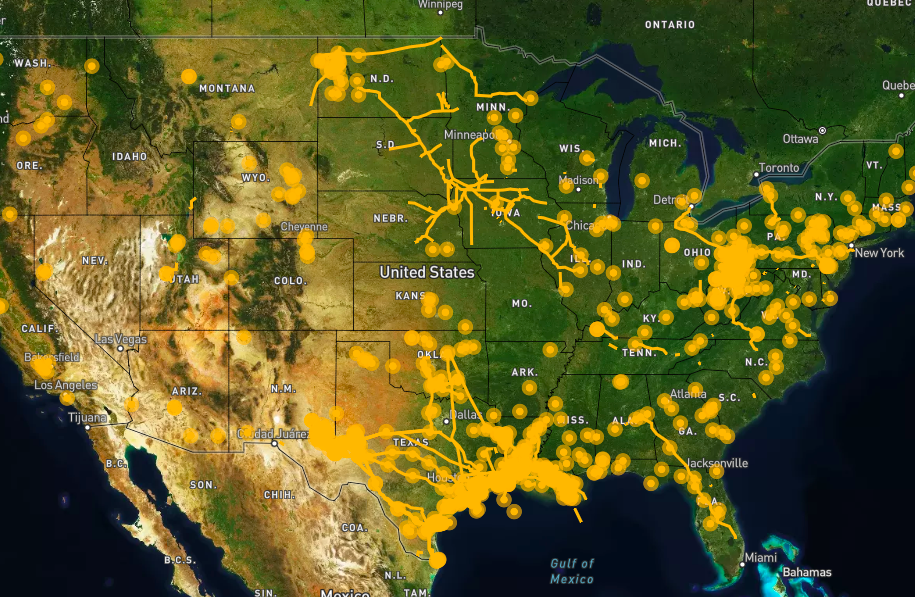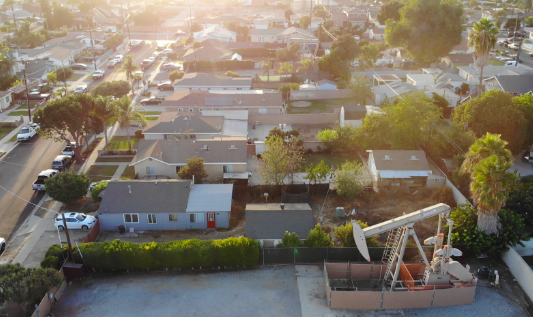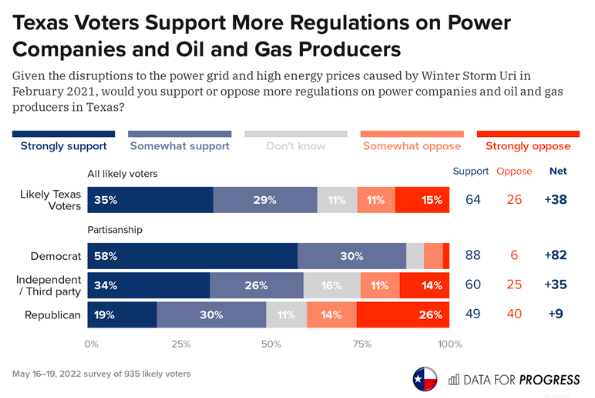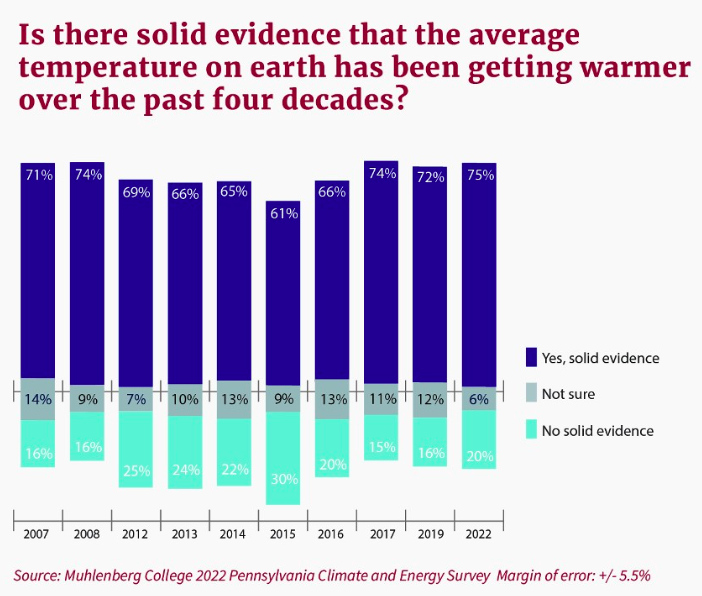Resources
Search below for resources covering the intersection of climate engagement, social science and data analytics.
RESULTS
Oil & Gas Watch Database
The interactive map below shows the locations of proposed new and expanding oil, gas, and petrochemical infrastructure projects that were approved or announced since 2012. 457 of these projects have been built over the last decade and are permitted to release up to 136,780,765 tons of greenhouse gases per year. An additional 538 projects have not yet been constructed, but have the potential to release an additional 205,341,832 tons of greenhouse gases per year.
Voters Say Lawmakers Should Listen to Communities Over Fossil Fuel Interests
Environmental advocates can strengthen their argument on permitting reform by framing it as an issue of communities vs. corporate interests. Voters overwhelmingly believe that input from impacted communities should be prioritized over input from industry association groups as Congress considers changes to the permitting process for energy projects. Voters support the Environmental Justice for All Act by a greater than three-to-one margin (69% support / 20% oppose) after reading a brief description of it. By a 65%-22% margin, voters prefer that lawmakers prioritize feedback from impacted communities over industry association groups like the American Petroleum Institute when considering changes to the permitting process. By a 56%-35% margin, voters say that President Biden should prioritize permitting for clean energy projects over fossil fuel projects. Just 16% of voters believe that permitting reform should be attached to the annual government spending bill, compared to 59% who say it should be considered as a standalone bill and 10% who say it shouldn’t be considered at all.
Environmental Polling Roundup - September 9th, 2022
This post includes climate and environment headlines, data points, and key takeaways from recent public polls - including new polling on the Inflation Reduction Act, attitudes toward the country’s major domestic energy sources, and a new paper on the behaviors and perceptions that correlate the most strongly with changes in climate attitudes.
Time to Put the Fossil-Fuel Industry Into Hospice
If humanity is to survive the climate crisis, we must manage a just and orderly transition away from fossil fuels. Acknowledge the full scope of the problem. Recognize the limited scope of economic policy solutions. Accept that substantially reducing greenhouse-gas emissions presents an existential challenge for the industry. We face the challenge of managing “compassionate destruction,” in which we guide all the complex and expansive elements of the fossil-fuel sector through a just and orderly transition to a carbon-free economy. Bring about the end of the entire sector through corporate collaboration. Protect workers and avoid labor flight during transition. Overcome political and social resistance to change. Account for the full scope of the financial impact of the transition. Control the fate of products both used and unused. Protect indirect workers in related industries. Maintain justice and equity for all communities. Decommission, remediate, and repurpose dedicated infrastructure. Leverage the power of government. Overhaul business education as if people and the planet really matter.
New Mexico voters widely support proposals to shift the state toward clean energy, reduce methane pollution, and protect safe drinking water. 89% of New Mexico voters support a proposal to provide funding to help rural and tribal communities repair systems that ensure safe drinking water. 70% of New Mexico voters support the state’s new requirements for the oil and gas industry to use technologies that limit methane emissions and other pollution. 58% of New Mexico voters support proposed state legislation that would make New Mexico a national leader in clean energy production and require that the state cut climate pollution by half by 2030 and reach net-zero by 2050.
Historic Environmental Justice Victory: City of Los Angeles is creating a pathway to phase out existing oil and gas wells
Residents, community organizations, and health care practitioners organized for over a decade to protect the health of residents on the front lines of urban oil extraction in L.A. In January 2022, the Los Angeles City Council voted unanimously to draft an ordinance to prohibit all new oil and gas drilling and to phase out existing drilling operations throughout the City of Los Angeles. This resource is based on an interview with Wendy Miranda (she/they), a community leader with Communities for a Better Environment (CBE) and resident, about the historic victory. The organizing strategy to get this victory involved various lobbying efforts, rallies, press conferences, petition collections, a wide range of community/organization endorsements, phone banking, and social media outreach. Overall, frontline residents providing public comments and sharing their personal experiences were some of the strongest and most powerful tactics. STAND L.A. will continue to be part of the process to help draft an ordinance and direct the City of Los Angeles on how to lead a genuine community participation process. Miranda shares that this victory is proof that frontline communities can lead the change toward a just, equitable transition to a clean energy future.
Texas voters view the clean energy transition as a net positive for the state economy, and most want to see their state leadership strengthen regulations on utilities and fossil fuel companies. 65% of Texans agree that state leaders such as Governor Greg Abbott and Attorney General Ken Paxton didn’t do enough to protect consumers with high energy bills following Winter Storm Uri, and two-thirds (67%) believe that the federal government should investigate possible price gouging by power companies during the storm. Additionally, only 35% believe that the Texas state government is doing enough to prepare the state for the impacts of climate change. The clear majority (64%) support more regulations on power companies and oil and gas producers “given the disruptions to the power grid and high energy prices caused by Winter Storm Uri in February 2021.” And by a 56%-34% margin, Texans side more with an argument that “regulations on energy companies need to be stronger in Texas to ensure power stays on and to protect Texas consumers from high prices” than a competing argument that “regulations on energy companies are an overstep of the government, don’t usually deliver the benefits they promise, and are not worth the cost.” Importantly, the poll also finds that more Texans believe that the clean energy transition will improve Texas’s economy (47%) than worsen it (35%).
A Decade Of Successes Against Fossil Fuel Export Projects In Cascadia
73% of initially planned oil, gas, and coal export projects in the region have been cancelled since 2012. Fossil fuel executives from dozens of companies once seemed to be salivating over the idea of exporting massive quantities of gas, oil, and coal from the Cascadia coast—but local communities, Tribes, environmentalists, and local governments rejected calls to turn Cascadia into a fossil fuel export terminal. They protested projects’ abrogation of Indigenous sovereignty, the risk of oil spills and damage to sensitive ecosystems, the pollution spewing from coal trains, the climate harms of extracting, transporting, and burning hydrocarbons, and the safety hazards of transporting flammable fuels through populated areas—and for the most part, they’ve won. Since 2012, fossil fuel interests have schemed more than 50 large projects to export coal, oil, gas, or their derivatives from Cascadia’s coast in British Columbia, Oregon, and Washington, and today, 40 of those—a whopping 73%—have been canceled by project backers who faced local opposition, see-sawing energy prices, and regulatory hurdles.
Poll: Spring 2022 Pennsylvania Climate and Energy Survey
A record-high percentage of Pennsylvanians (75%) say there is “solid evidence” of global warming; Pennsylvanians are divided on fracking and the long-term impacts of gas drilling in the state. 77% of Pennsylvanians view global warming as a “serious problem” (including 53% who rate it as “very serious”) further demonstrates a clear statewide consensus around the reality and risks of climate change. The poll also finds that Pennsylvanians are feeling cross-pressured on the issue of fracked gas, as large majorities believe both that gas drilling is important to the state’s economy (86%) and that it poses a major risk to the state’s water resources (67%). Pennsylvanians are divided on fracking in general, as 48% support and 44% oppose the extraction of gas from shale deposits in the state. State residents have similarly mixed attitudes as to whether gas drilling will provide more benefits (44%) or more problems (40%) for Pennsylvania in the future. When asked an open-ended question about the primary risks of fracking in Pennsylvania, meanwhile, residents are most likely to name water contamination (26%) and general environmental damage (14%).
10 Recommendations on How to Campaign on Energy When Everybody Is Thinking about War
This resource proposes 10 recommendations for campaigners to strengthen their energy advocacy. These are rooted in 4 future scenarios of how public perceptions and mindsets around energy independence could evolve in the coming months. Recommendations include: Engage people in developing an energy-saving plan to become less dependent on Russian imports. Make the objectives in your plan tangible by adding numbers to them. Aim to unite people behind some ideas supported by majorities. Congratulate the effort and sacrifice. Showcase or create visible innovators and early movers. Gradually raise the bar and establish the new standards as normal even before they become law. Connect the new norms to new or old identities. Make the best use of the efforts of various research organisations to study the changes in public opinion. Be extremely sensitive and listen to any narrative of injustice that evolves. Be mindful and vigilant in your response to divisive forces.
Pagination
- Previous page
- Page 3
- Next page






